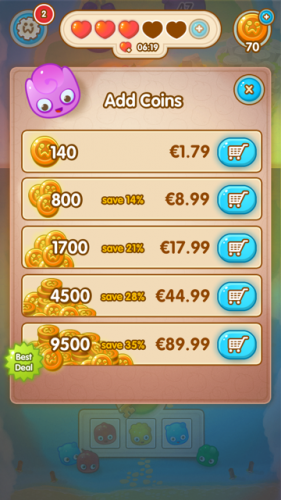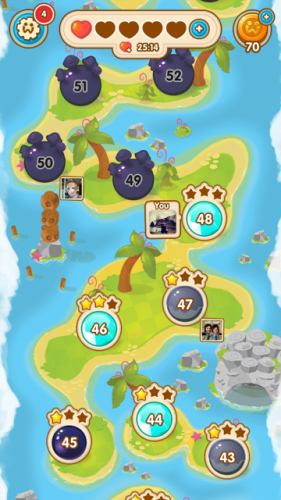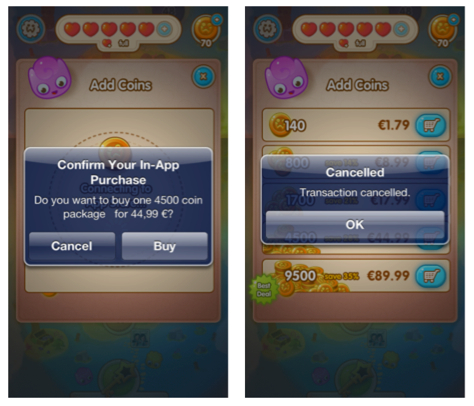The Wooga Jelly Splash game was released last week. Read below about why it is better monetized than Candy Crush Saga.
Jelly Splash is a strong match-3 middling, which was developed according to a special prototyping model (we wrote about it in a separate article). The gaming press did not take the project very warmly. Pocket Gamer gave her 6 points out of 10, 148apps – 3.5 points out of 5, Gamezebo – 3 out of 5.
However, an article by Mikhail Katkoff appeared today, in which he assures that the monetization of Jelly Flash is better than that of the current box office leader Candy Crush Saga. Why?
Game currency
In Jelly Flash, unlike Candy Crush Saga, there is an in-game currency. These are gold coins. They allow you to buy more moves (it’s easier to pass levels this way), replenish energy and give instant access to new content (no need to send requests to Facebook friends).
Replacing direct payments with in-game currency looks like a minor innovation. But, according to Katkoff, currency is a key performance indicator for the following reasons.
1. Increase in average purchase
Imagine that the player wants to immediately open a pack with new levels. The pack costs $0.99. Without the game currency, the user simply pays $0.99 and continues to play.
The currency in Jelly Splash allowed Wooga to set a minimum payment threshold of $1.99. At the same time, the player was given twice as many game coins as he needed to access the pack with additional content.
So the profit can grow twice at once. In addition, according to Katkoff, there is no need to worry about the price increase itself. The elasticity of demand changes insignificantly when the value of supply changes between $1 and $2.

In–game currency is a great way to increase the size of the average price. Just increase the cost of the minimum payment and enter a wholesale discount mechanism (the more you buy, the greater the discount).
2. Increase retention
Players who have bought game currency tend to return to the game to spend it. This is a psychological moment. They realize that they have spent real money on it. They need to realize their purchase in full.

3. Reducing the outflow of potential buyers
As a rule, there is a serious gap in the number of users between the decision to purchase something and the completion of the purchase.
Suppose the user does not pass the level, out of anger he decides to buy a consumable. But if the game does not have its own currency, he has to first answer the question whether he really wants to make an IAP, then type in the password. This cuts off some of the potential buyers.
At the same time, if he has already paid for something once, he has a little game currency left, which is just enough for a booster. That is, the user continues to spend, he gets used to doing it, so the next time when buying currency for real money, internally he will resist it less.

The more confirmation notifications, the higher the probability that the user will refuse the purchase4. Interested players
With the help of in-game currency, you can also increase the retention of players already interested in the project by arranging tournaments, events, distributing daily bonuses, and so on. The bottom line is that the reward in such events will be the game currency.
By giving players the opportunity to earn something that costs real money, you increase retention and stimulate spending inside the application.
5. Video Advertising
Another great way to monetize is video advertising, for viewing which the user receives in-game currency. But here it is necessary to take into account several points at once:
- the content of advertising should not be a hindrance to gameplay
- the player must be asked if he wants to watch it or not (and questions should not be bothered)
- it is necessary to conduct A / B testing, during which to find out the size of the reward for viewing and the attitude of various groups to it
According to Katkoff, the developers of Hay Day best implemented video advertising in their project.

In the mailbox, the player finds a movie ticket. When clicking on a ticket, a reward and a notification are issued, in which the user is asked if he wants to watch an advertisement for an additional reward..
6. You can earn money from the game even offline
The game currency allows players to take the maximum out of the game even in the absence of the Internet. Let’s say you’re on a plane. You may have time to play more times in a row than the energy bar allows. But this is not a problem for you – you just buy a pack of coins before the flight and use it when you are offline.
A source: deconstructoroffun.blogspot.com
